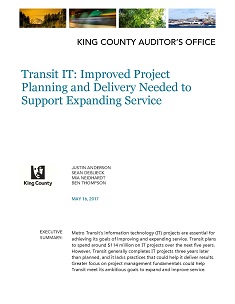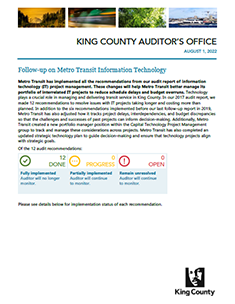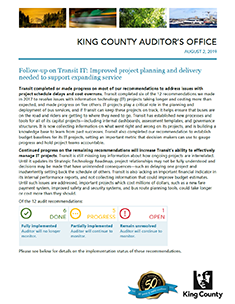Transit IT: Improved project planning and delivery needed to support expanding service
May 16, 2017
NEW! Download the latest follow-up report
Metro Transit’s information technology (IT) projects are essential for achieving its goals of improving and expanding service. Transit plans to spend around $114 million on IT projects over the next five years. However, Transit generally completes IT projects three years later than planned, and it lacks practices that could help it deliver results. Greater focus on project management fundamentals could help Transit meet its ambitious goals to expand and improve service.
Status
Of the 12 recommendations:
| DONE | 12 | Recommendations have been fully implemented. Auditor will no longer monitor. |
|---|---|---|
| PROGRESS | 0 | Recommendations are in progress or partially implemented. Auditor will continue to monitor. |
| OPEN | 0 | Recommendations remain unresolved. Auditor will continue to monitor. |
| CLOSED | 0 | Recommendation is no longer applicable. Auditor will no longer monitor. |
Summary
Transit’s information technology (IT) projects are essential for improving and expanding services. Transit must make several improvements to ensure that IT projects are completed as promised. First, it lacks a sufficient process to use lessons learned to inform future projects and avoid repeating mistakes. Second, while generally completing projects three years later than estimated, it lacks a process to determine why projects are late and to use this information to inform future estimates. Third, it does not baseline project budgets, which is necessary to fully evaluate project performance and control costs. Finally, Transit has insufficient portfolio planning and management of its IT projects to ensure that funded projects address strategic priorities.
We make 12 recommendations that support Transit’s IT project and portfolio management. We recommend that Transit develop a lessons learned process to share information across projects and inform future planning. We also recommend that Transit improve its collection of schedule information and track project spending against a baseline budget to support current projects and enhance lessons learned data. Finally, we recommend that Transit build on the Strategic Technology Roadmap for Transit (STRT) work to better define and document its IT portfolio development process and the relationships and dependencies of projects within the portfolio.
Reports related to this audit
Currently, there are no related reports to this project.
Audit team
Justin Anderson, Sean DeBlieck, Mia Neidhardt, and Ben Thompson conducted this audit. If you have any questions or would like more information, please call the King County Auditor's Office at 206-477-1033 or contact us by email KCAO@kingcounty.gov.

 Translate
Translate


